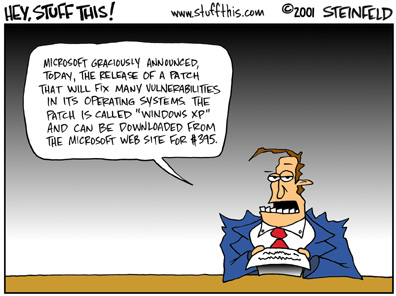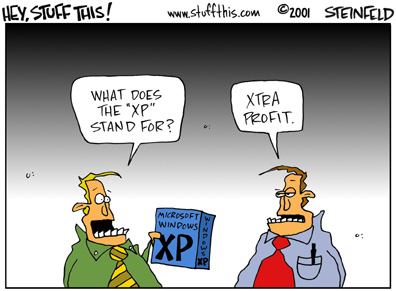
X vs XP |
 | |
|
There has been a LOT of press about Apple’s current Mac operating system, OS X. (Note the “X” is the Roman numeral for ten, so you can also call it “OS 10”.) OS X is based on the well-regarded UNIX foundation. The benefits include superior performance, outstanding stability, an operating system familiar to businesses and MIS people, open source architecture, etc.
Referring to innovations already implemented in Tiger, this report from eWeek says, based on their lab tests of OSX, “we were impressed with Apple’s smooth implementation of the open-source Samba Windows file-sharing and Common Unix Printing System components, as well as with the operating system’s interface performance... One of the most intriguing things in the new operating system is Rendezvous, a networking technology Apple released under its Public Source License, which is intended to forge links among disparate devices with minimal configuration required... A variety of network printer,consumer electronics and other device and software manufacturers have announced plans to support the technology in their products. ” In Reality Check, CNET reports that Rendezvous “makes child’s play out of connecting to network-based resources (storage, printers, databases, etc.) including those bound to Windows systems.” For more details see this. Among other lavishly praised Apple developments are Quartz (Mac OSX’s high end image rendering engine) and Expose, the most innovative window management tool available anywhere at any price. A Wintel person? Then how about this comprehensive comparison. A Linux fan? Then you’ll really relate to this LONG Linux Journal article: UNIX Under The Desktop. They say such things as “OS X gives us the first popular desktop OS that fits into a prevailing Linux environment and also into the prevailing marketplace. On the bottom, it’s UNIX. On the top, it runs Microsoft Office and the whole Adobe suite.” They go on to emphasize another significant distinction of OS X: it is basically open-source. “Apple also has attracted some top talent from the open-source ranks. Brian Croll, who runs OS X engineering for Apple, was recruited from Eazel. Jordan Hubbard, the world’s foremost BSD hacker (and a founder of FreeBSD), actually pitched his way into a job working on Darwin at Apple.” And for Linux advocates, here is a bonus: Linux guru Dr. Moshe Bar has a lot to say at Byte: “ If you have been using Linux for some time and just love its stability and performance, and find it a natural platform for development, you’ll feel right at home on the Mac OS X. On the other hand, if you feel at times frustrated by the difficulty with which modern devices (like wireless, DVD, or FireWire devices) work on Linux, then you might find Mac OS X to be what you’ve been longing for. I for one, am convinced: I am switching my laptop to Mac OS X.” He went on to say the conversion was “trivial”. Now that you are warmed up maybe you’d like to check out how Gentoo is on a Mac, or GNUstep, or Fink, or Wine, or Darwin, or more than you could have imagined. --------------------------------- “Windows XP is now equal to the Mac OS!” I know what you’re thinking, but no — this is not a quote from Rodney Dangerfield! One of my favorite sayings is “People who do not learn from history are doomed to repeat it.” I have found it more than amusing when I heard something like “Windows has now caught up with the Mac”, following the introduction of Windows 3.1, 95, 98, NT, 2000, ME, XP, etc. Yet every one of these Macintosh-Wanna-Be versions of Windows has been not much more than a second rate copy of the Mac OS. Every indication is that this RELATIVE difference will continue for the foreseeable future, based on one fundamental fact: Apple is the technology leader of the personal computer industry, while Microsoft’s primary claim to fame is that it has mastered the skill of copying well. Read more of what others have to say about Microsoft. If you choose not to take my word for how XP compares to the Mac OS, then you should do some reading. Here are a few sample places to start (note the diversity of sources, none of which are Mac sites): Windows XP - Breaking Things [Forbes]The Detroit Free Press put it into perspective by saying: “The new OS X for Mac runs circles around Windows XP, booting up faster, recognizing digital devices easier, burning CDs better and playing digital music and video cleaner. Mac’s iMovie video editing feature is simply astounding and so simple that it makes the Windows XP video editor look clumsy and complicated...” Here is an exceptionally detailed, current (2006), and objective OS X(Tiger) side-by-side XP comparison that concludes that OS X is the better choice. The gist of these articles is that “Windows XP is a downgrade of Windows 2000”, which itself was no match for the Mac OS (especially OS X). [Example: ref Windows 2000 Bugs.] And note that the Anandtech XP - Feel The Pain article cited above shows that, as tested, Windows XP is some 25% slower AND more-resource-hungry, than the already-demanding Windows 2000.  Even a self-proclaimed fanatical Windows promoter, John Dvorak, says about XP: “I do sense that, like many Microsoft products, XP suffers from software entropy. Each new patch fixes one thing but also introduces new bugs. These second-generation bugs tend to go unnoticed at first and are seldom, if ever, fixed.” He then goes on to elaborate on several XP deficiencies... Sounds like a ringing endorsement of Microsoft and XP to us, Mr. Dvorak. ----------------------------- Additionally, there have also been many reports of serious security issues with XP (e.g. for a slightly different type of discussion see The Death Of TCP/IP). And read this profoundly comprehensive write-up about Microsoft security in XP, which concludes “It is apparent that, for unfathomable and never articulated reasons of their own, Microsoft is DETERMINED to ship an inherently unsecurable, consumer-targeted operating system, containing the openly accessible Internet research interfaces known as Full Raw Sockets. I think that’s really dumb.” This disturbing but interesting story at New Scientist discusses a serious Windows liability. “An ‘unfixable’ flaw that leaves your desktop PC open to serious abuse has been exploited in Microsoft’s Windows operating system. The trick could be used by an attacker to discover your passwords, copy your files or even format your hard disk... a Microsoft vice president Jim Allchin told a court (May 2002) that errors had been identified in Windows but should not be revealed for security reasons...The flaw is part of the fundamental design of the Windows operating system... and has remained unchanged since 1993.” If that weren’t bad enough, this recent article says that not only do Windows XP error reports have dubious value, but they can convey private information about you to Microsoft. This 16 page 2003 piece says "Microsoft learns a lot about your computer, when you connect to Windows Update. Newer versions of Windows Update send a significant amount of data to the Microsoft update server". And this story makes a similar conclusion about XP’s "product activation process". (The site with the last two links has recently disappeared (!), but I’m showing the cover original pages so you get the idea.) And then "XP’s Wi-Fi software may tell hackers an access point’s hidden SSID. But it doesn’t stop there, it’s possible to "spoof" the XP machine into believing it has connected to a familiar network." Another scientist phrased the security problem from a slightly different perspective: “In biology, if the members of a herd are too genetically similar, a single disease can wipe them out. Ditto with computer systems. As Microsoft becomes increasingly dominant, the users of its programs are open to weaknesses that they may not know exist — until it is too late... If nothing else, the problems of macro-viruses have shown the weakness inherent in Microsoft’s dominance of both business software and home PCs.” Consistent with this, in a technical study released in November of 2002, it was reported that 2002 “has been the worst on record for overt digital attacks, with 57,977 attacks to date. Microsoft Windows suffered the highest percentage of overall attacks, 54 percent, followed by Linux, with 30 percent... The Mac OS suffered only 31 overt digital attacks, only 0.05 percent of the total.” With all this negative publicity, one would think that by now Microsoft would be REALLY sensitive to security matters, and would be going out of their way to see that any new OS would be super secure. Guess not. So if they are that cavalier about something as important as YOUR security, what might that tell you about the quality of the rest of their OS??? ----------------------------- The ever-more control that Microsoft is attempting to take over computer operators (forcibly and without the user’s awareness) is also a VERY disturbing trend that continues unabated with XP. (Note our comments.) Then read this lengthy and very reasoned discussion. It says (in part): “Microsoft Windows XP connects with Microsoft’s computers in at least sixteen hidden ways! It is expensive to evaluate the present privacy and security vulnerabilities of these connections and impossible to evaluate the future vulnerabilities. “The issue is not that the connections are always bad for the user. The issue is that Microsoft has moved from making operating systems that are independent to making operating systems that are dependent on Microsoft computers. Besides privacy and security vulnerabilities, this raises numerous concerns. For example, if Microsoft decided to remove the support for Windows XP, users might be forced to upgrade. Or, Microsoft could decide to ask for monthly payment for the use of its computers.”  This open letter to the FTC says: “On July 26, 2001, we submitted a complaint to the Federal Trade Commission endorsed by fifteen leading consumer advocacy groups detailing the serious privacy implications of Microsoft Windows XP and Microsoft Passport, and alleging that the collection and use of personal information by the company would violate Section 5 of the FTCA. On August 15, 2001, the groups submitted a supplement to the FTC further detailing the specific ways in which Microsoft XP and Passport would harm the consumer interests you have been charged with protecting... Subsequently, Microsoft announced plans to make Passport more open to other companies, and falsely claimed this as an improvement in privacy. Although this change may address other legal concerns, it does not address the major privacy and unfairness objections in the groups complaint.”
The Washington Post (evidently an Apple shill) ran a detailed article studying how the Mac OS X handled digital photography, as compared to the Windows XP methodology. (This area was chosen as the Post says that it is accepted as being an important part of the computing experience, and will be even more-so in the future.). The long two-part story says such things as “Apple’s much richer system offers multiple ways to view your shots...Apple takes a decisive lead at putting your photos on the Web...XP’s two integrated Web-publishing options are lame in comparison...” and concludes with “The verdict: If you’re shopping for a new machine, you’ll probably be much happier with iPhoto” on a Mac. And it might well be worse than that. In December of 2003, Gartner, the well-respected computer research firm, stated that its best guess was that there was only a 50 percent chance Longhorn will be available in 2006, and a 40 percent chance it won’t be available until 2007. Download a printable pdf version of this document (rev: 3/06/04). If you have any constructive comments or suggestions about this page, This section’s Haiku rev: August 6, 2007 — Section #5 — |